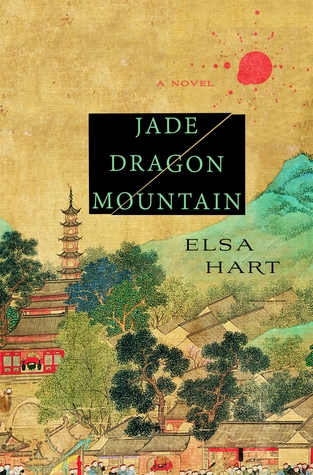 Jade Dragon Mountain by Elsa Hart
Jade Dragon Mountain by Elsa Hart Formats available: hardcover, paperback, ebook, audiobook
Pages: 336
Published by Minotaur Books on September 1st 2015
Purchasing Info: Author's Website, Publisher's Website, Amazon, Barnes & Noble, Kobo, Bookshop.org
Goodreads
On the mountainous border of China and Tibet in 1708, a detective must learn what a killer already knows: that empires rise and fall on the strength of the stories they tell.
Li Du was an imperial librarian. Now he is an exile. Arriving in Dayan, the last Chinese town before the Tibetan border, he is surprised to find it teeming with travelers, soldiers, and merchants. All have come for a spectacle unprecedented in this remote province: an eclipse of the sun commanded by the Emperor himself.
When a Jesuit astronomer is found murdered in the home of the local magistrate, blame is hastily placed on Tibetan bandits. But Li Du suspects this was no random killing. Everyone has secrets: the ambitious magistrate, the powerful consort, the bitter servant, the irreproachable secretary, the East India Company merchant, the nervous missionary, and the traveling storyteller who can't keep his own story straight.
Beyond the sloping roofs and festival banners, Li Du can see the mountain pass that will take him out of China forever. He must choose whether to leave, and embrace his exile, or to stay, and investigate a murder that the town of Dayan seems all too willing to forget.
I absolutely loved this book. I was swept away instantly, and remained fully immersed in the author’s world until the very last, reluctantly turned, page.
Jade Dragon Mountain reminds me of The Name of the Rose by Umberto Eco, but upon analysis, I am not sure why. That I read The Name of the Rose 30 years ago does not help the comparison. But the feeling is still there.
While Rose has a library at its heart, the investigator in Jade, Li Du, is a librarian. And an exiled librarian at that, forced to leave his post at the Imperial Library in Beijing because he allowed a traitor to do research at the library. Li Du was never part of the conspiracy, he seems to have been a bit of collateral damage.
But he has found his calling as a scholar wanderer, roaming the roads and small villages of the Chinese Empire in 1708 to discover whether all the travel journals he read while at his post contain truth, or are composed mostly of hyperbole. In the middle of his wanderings he comes to remote Yunnan province in the southwestern portion of the Empire. Yunnan is one of the great tea producing regions of China, and it was in 18th century China as much as it is today.
Li Du comes to Dayan, the capital of the province, to check in with the local magistrate, as is required by his sentence of exile. Fortunately for Li Du, the magistrate of the province is his cousin. Unfortunately for Li Du, Dayan is about to receive an unprecedented visit from the Emperor who exiled him. The Emperor has predicted that there will be a lunar eclipse, visible in Dayan, in just a few days.
The prediction was made a year ago, in secret consultation with Jesuit astronomers. It takes an entire year to travel from Beijing to Dayan, but the Emperor considered the journey worth the investment of time. Yunnan Province has only recently been brought fully under the Manchu Empire, and there are still pockets of resistance. The ceremony of the fulfillment of the Emperor’s prediction will do much to showcase his divinity and the pre-eminence of his empire.
If the entire ceremony isn’t derailed by the death of one old Jesuit scholar, who has come to Dayan, like so many other foreigners, for a brief glimpse of the otherwise closed Celestial Empire. While everyone in the provincial palace is bent on sweeping the crime and the old man’s body under the carpet, Li Du is unwilling to let the truth rest in an untended grave.
Because Li Du, wandering scholar, is certain that the old priest was murdered. He is reluctantly, and with many threats of punishment, given 6 days to find the murderer before the Emperor arrives.
He has barely enough time to solve the case. The questions are the eternal ones, who benefits from this man’s death, and who benefits from covering it up, and most tellingly, who benefits from covering it up in the particular way that it is done. In the process of his investigation, Li Du finds motives upon motives, and a killer lurking in the most unlikely place.
And he very nearly does not find out enough.
Escape Rating A+: This story takes place at an absolutely fascinating point in history. In 1708, the Qing Dynasty, known more popularly in the West as the Manchu Dynasty, was in power. But the days of the previous dynasty, the Ming Dynasty, are still within living memory, although just barely. The Ming and their supporters still considered the Manchu barbarian outsiders, and there were still rebellious impulses. The Yunnan Province, while it had been part of China for centuries, had only been very loosely governed from Beijing until the later Manchu. The previous provincial royal family had been decimated, but they and their adherents were still around.
Also, the wealth of China and its markets was completely closed to the West at this point. The British East India Company was extremely powerful, and was absolutely salivating at the possibility of entering China to engage in their own unique brand of conquest through economic hegemony. The First Opium War is still in the future. Considering the way things were already going in India, resistance may have been futile, but it was well worth fighting.
So the story centers around one of the rare occasions when China was open, if not to the West, then at least to certain select Westerners who could pay tribute to the Emperor and make their case for more access. And because this festival is taking place in a far-flung province, there is even more opportunity than usual for nefarious double-dealings and attempts to change the state of affairs, or overthrow them all together. It is also an unprecedented opportunity for officials in the province to have a chance to catch the eye of the Emperor, and perhaps gain future influence and position back in the capital.
In other words, everyone is a stranger or an outsider, security is in disarray, and every man and woman is out for their own interests. It’s a great place for a murderer to hide in plain sight.
Li Du is both a fascinating and an enigmatic character. We know very little about him, only that he has been exiled from the capital for not being rigorous enough in his observations of researchers working in the library. But his exile has put him in the position of being both an insider and an outsider in his cousin’s province. Li Du knows the things that are supposed to be said in public, as opposed to what is known and believed in private, but he is also in a position where he doesn’t have to care. He’s already been punished.
He serves the truth. And he rightfully fears that if the death of the old Jesuit was murder, that sweeping his death under the carpet leaves a murderer on the loose. He is a dogged investigator, but he has no modern forensics to work with. So in the end, he studies the crime, it’s motives, and even more, the motives for covering it up. In the end, it is all about stories. Not just because his friend and assistant is a professional storytelling, but because it is the way that this crime is meant to tell a particular story in a particular way that leads to the killer.
That it just doesn’t lead far enough makes for a surprising, and surprisingly satisfying, conclusion to the mystery, and finally wraps all of the events and their motives into a neat little package.




















